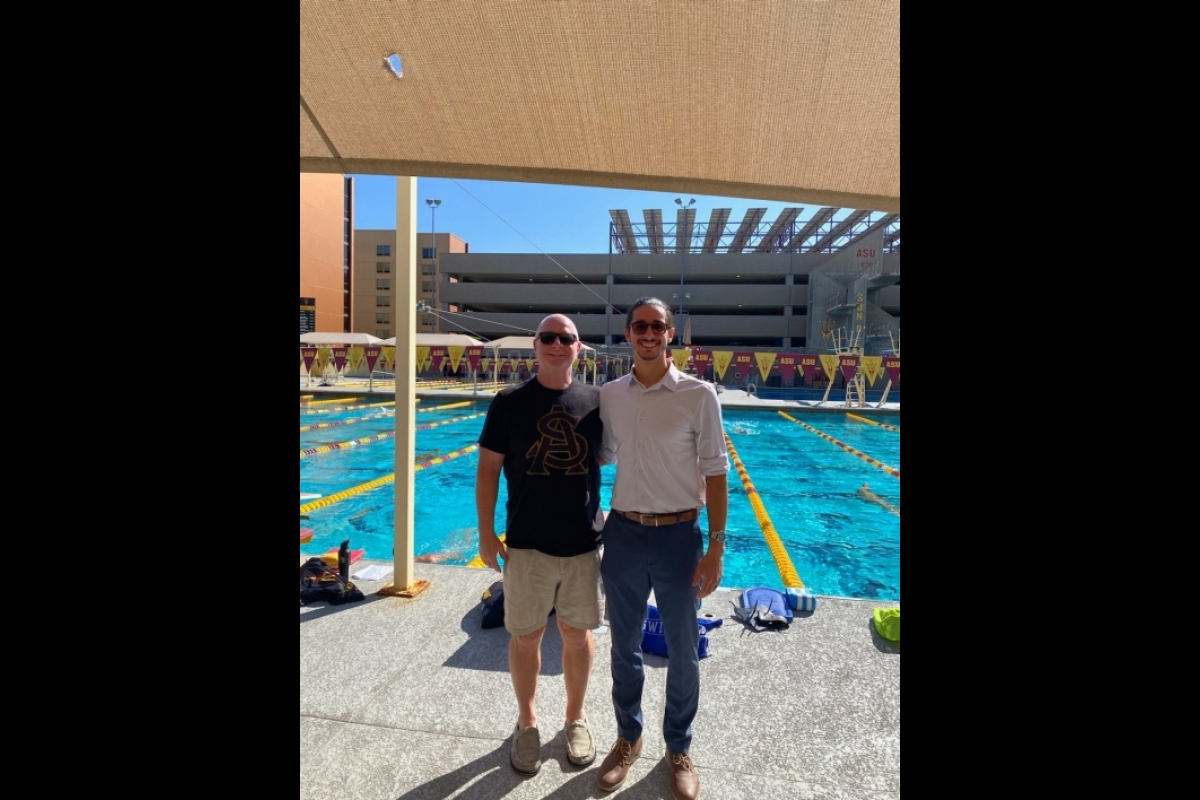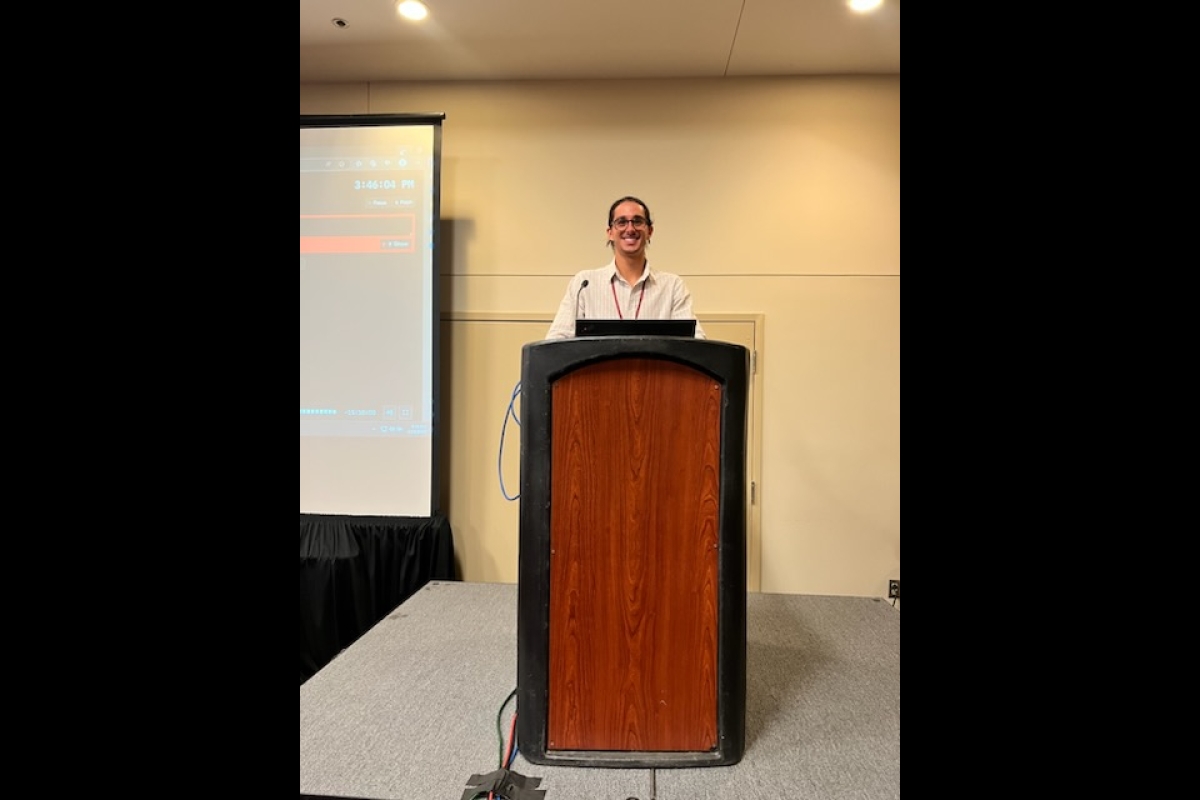Editor’s note: This story is part of a series of profiles of notable fall 2023 graduates.
Without ASU's generosity and commitment to balancing athletics and academics, international student Juan José García Mesa might not have embarked on his transformative journey toward earning a PhD in biological design at the School for Engineering of Matter, Transport and Energy, part of the Ira A. Fulton Schools of Engineering.
Transferring from the University of Barcelona during his junior year, García Mesa’s decision was not only driven by academic pursuits but also by his passion for swimming.
Throughout his time at ASU, his experiences extended beyond the academic realm. Diverse friendships broadened his perspective, fostering tolerance and interdisciplinary thinking. Lessons learned from both undergraduate and graduate classes equipped him to tackle problems from various angles.
He also had an influential mentor in Professor Reed Cartwright. Over six years of working with Cartwright in the Biodesign Virginia G. Piper Center for Personalized Diagnostics, García Mesa not only honed his research and programming skills but also imbibed valuable life lessons.
Following graduation, García Mesa plans on working as a bioinformatician in Phoenix or Southern California.
Read more about Juan José García Mesa's experience at ASU below.
Note: Answers may have been edited lightly for length or clarity.
Question: What was your “aha” moment when you realized you wanted to study the field you majored in?
Answer: Finishing my undergrad, I joined Professor Cartwright's lab as a student programmer to gain experience and earn some money. The research in the lab combined genetics, statistics and software development. This on-campus employment gave me the opportunity to do a research study with Professor Cartwright as part of my major's thesis, focusing on developing an algorithm to estimate evolutionary parameters. It was during this time that I developed an interest in computational biology — as it allowed me to apply my passion for programming to study biological phenomena — and decided to pursue a doctorate in the field.
Q: What’s something you learned while at ASU — in the classroom or otherwise — that surprised you or changed your perspective?
A: My time at ASU has taught me to be more tolerant as a person and more interdisciplinary in my work. Thanks to the friendships I've developed with people from around the world, I now have a broader vision and I am less judgemental. Similarly, some of the classes I took, both as an undergrad and as a grad student, have pushed me to tackle problems from different perspectives and discover solutions I would have otherwise never thought of.
Q: Why did you choose ASU?
A: I transferred to ASU from the University of Barcelona, Spain, in my junior year to join the swimming and diving team. In Spain, and in most parts of Europe, athletics and college education are separate and professors are not required to make accommodations when you miss classes or exams due to sporting events. This makes the U.S. a popular destination for athletes who want to further their education while developing their athletic careers. After interviewing with the coaching staff at ASU, I knew ASU would be a good fit for me, so when they offered me a partial scholarship I didn't hesitate.
Q: Which professor taught you the most important lesson while at ASU?
A: The professor I have learned the most from while at ASU is by far Professor Cartwright. I have been at his lab for more than six years now, combining undergrad research, a year of
optional practical training and grad school. ... The most valuable lessons he's taught me are to be kind to others, give those around you the space and tools they need to grow and accomplish their goals, and find joy in what you do.
Q: What’s the best piece of advice you’d give to those still in school?
A: I would tell them to find a work-life balance that is sustainable long term. Often the load of classes and research can feel overwhelming, and it's easy to forget to take care of yourself at times. Find a routine that keeps you motivated and healthy, and don't hesitate to ask for help if you need a hand.
Q: What was your favorite spot on campus, whether for studying, meeting friends or just thinking about life?
A: My favorite spot on campus for socializing and exercising is the Mona Plummer Aquatic Center, where I used to train while on the ASU swimming team and where I now swim with a masters club. It's located between the Fulton parking garage and the football stadium. A close second is a small park behind the Biodesign Institute — a great spot to bring your lunch and enjoy a break in the shade where you can almost always spot a few squirrels running around.
Q: What are your plans after graduation?
A: I am currently applying for jobs as a bioinformatician in Phoenix and Southern California and hope to start work in early January.
Q: If someone gave you $40 million to solve one problem on our planet, what would you tackle?
A: I would use the money to build better food and water supply systems in areas where those resources are scarce and their population depends on humanitarian organizations to meet those needs.
More Science and technology

ASU researchers develop special microphone to verify human speech
Deepfakes have become a large societal concern with the advent of video and audio content generated by artificial intelligence,…

Leading students toward a future of renewable energy
Nicholas Rolston, assistant professor in the School of Electrical, Computer and Energy Engineering, one of the Ira A. Fulton…

SPARCS mission spacecraft bus delivered to ASU for final assembly
The Arizona State University team that is building the NASA-funded Star-Planet Activity Research CubeSat, or SPARCS, cleared a…


